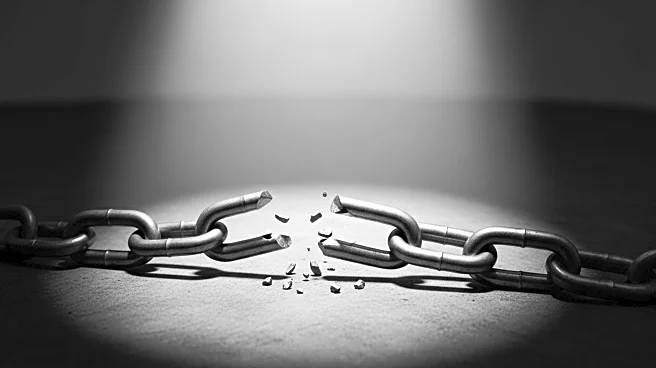What's Happening?
Mae Martin's new series 'Wayward' has been released on Netflix, offering a dark exploration of the troubled teen industry. The show is set in Tall Pines, Vermont, and follows two best friends, Abbie and Leila, who are trapped in a boarding school that claims to solve adolescent issues. The head youth counselor, Evelyn, uses controversial therapeutic techniques, prompting the girls to plan their escape. The series draws inspiration from real-world issues, including a U.S. Senate Finance Committee report that exposed abusive practices in youth residential treatment facilities. Martin, who created, wrote, and produced the series, was inspired by personal connections to the story, including a friend who experienced such an institution.
Why It's Important?
The series 'Wayward' sheds light on the troubled teen industry, which has been criticized for its abusive practices. By dramatizing these issues, the show raises awareness and calls for reform in how youth are treated in residential facilities. The U.S. Senate Finance Committee's report and advocacy by figures like Paris Hilton have highlighted the need for change. The series also touches on broader themes such as trauma, addiction, and the impact of intergenerational experiences, encouraging viewers to reconsider how young people are treated and empowered.
What's Next?
The release of 'Wayward' may prompt further discussions and actions regarding the reform of youth treatment facilities. Advocacy groups and policymakers could use the series as a tool to push for legislative changes and improved oversight. The show's portrayal of the troubled teen industry might inspire more media coverage and public interest in the topic, potentially leading to increased pressure on institutions to change their practices.
Beyond the Headlines
Beyond its immediate impact, 'Wayward' explores deeper themes of trauma and the societal pressures faced by adolescents. The series encourages viewers to connect with their inner rebellious teen and challenges the way society gaslights young people out of their anger and distress. It also highlights the importance of empowering youth and addressing the emotional and psychological challenges they face.










